Book contents
- Frontmater
- Dedication
- Contents
- List of Illustrations
- Acknowledgments
- Foreword: Courtesy of the Artists
- Introduction: On Cinema Expanding
- Part One Materialities
- 1 Cinema as (In)Visible Object; Looking, Making, and Remaking
- 2 Objects in Time; Artefacts in Artists’ Moving Image
- 3 Materializing the Body of the Actor; Labour, Memory, and Storage
- 4 How to Spell ‘Film’; Gibson + Recoder’s Alphabet of Projection
- Part Two Immaterialities
- 5 The Magic of Shadows; Distancing and Exposure in William Kentridge’s More Sweetly Play the Dance
- 6 Douglas Gordon and the Gallery of the Mind
- 7 A Throw of the Dice Will Never Abolish Chance; Tacita Dean’s Section Cinema (Homage to Marcel Broodthaers)
- Part Three Temporalities
- 8 The Photo-Filmic Diorama
- 9 The Cinematic Dispositif and Its Ghost; Sugimoto’s Theaters
- 10 Time/Frame: On Cinematic Duration
- Part Four The Futures of the Image
- 11 Interactivity without Control; David OReilly’s Everything (2017) and the Representation of Totality
- 12 Post-Cinematic Unframing
- 13 Absolute Immanence
- Index
11 - Interactivity without Control; David OReilly’s Everything (2017) and the Representation of Totality
Published online by Cambridge University Press: 23 June 2021
- Frontmater
- Dedication
- Contents
- List of Illustrations
- Acknowledgments
- Foreword: Courtesy of the Artists
- Introduction: On Cinema Expanding
- Part One Materialities
- 1 Cinema as (In)Visible Object; Looking, Making, and Remaking
- 2 Objects in Time; Artefacts in Artists’ Moving Image
- 3 Materializing the Body of the Actor; Labour, Memory, and Storage
- 4 How to Spell ‘Film’; Gibson + Recoder’s Alphabet of Projection
- Part Two Immaterialities
- 5 The Magic of Shadows; Distancing and Exposure in William Kentridge’s More Sweetly Play the Dance
- 6 Douglas Gordon and the Gallery of the Mind
- 7 A Throw of the Dice Will Never Abolish Chance; Tacita Dean’s Section Cinema (Homage to Marcel Broodthaers)
- Part Three Temporalities
- 8 The Photo-Filmic Diorama
- 9 The Cinematic Dispositif and Its Ghost; Sugimoto’s Theaters
- 10 Time/Frame: On Cinematic Duration
- Part Four The Futures of the Image
- 11 Interactivity without Control; David OReilly’s Everything (2017) and the Representation of Totality
- 12 Post-Cinematic Unframing
- 13 Absolute Immanence
- Index
Summary
Abstract
The contemporary form of David OReilly's Everything (2017) belies its engagement with the past – specifically, with the origins of both ecological consciousness and our globalized informatic economy in the visual culture and systems thinking of the late 1960s. The work's central formal device is the mode of scalar visualization popularized within the Eames's iconic Powers of Ten (1977). That film placed Man at the literal and metaphorical center of its universe, obviating both non-human life and ecological relationality to do so. By contrast, OReilly's world solicits our identification with literally ‘everything’ – living and non-living, from the cosmically large to the microscopically small – except the human. A soundtrack featuring the late Buddhist philosopher Alan Watts reinforces its vision of total relationality.
Keywords: Animation, interactivity, perspective, the Anthropocene, ecology, visualization
This world is not your world / Everything is a game based on the game you’re in / and, if we’re being honest, a pretty shabby reflection of it / but, this isn't about giving you something different to see, but giving you a different way of seeing / if you can see that you are neither big nor little – this nor that / you might also see that I am neither real nor unreal, but both!
The Irish artist David OReilly has produced a body of aesthetically innovative experimental animation that has achieved rare popular and critical acclaim. Working inside and outside of industry, he has produced short films independently and for Cartoon Network, video walls for the concerts of British-Tamil musician MIA, and animated sequences for Spike Jonze's indie feature film Her (2013). His most ambitious project, Everything (2017), is a quasi-interactive work of procedural animation utilizing three hours of historical lectures by the late philosopher Alan Watts (from a database of three-hundred hours that had been constructed). Its trailer was nominated for an Academy Award, even though the work itself was marketed and distributed as a video game.
Everything departs from most of the other works in this collection in significant ways. Firstly, its creator does not readily identify as a contemporary artist, and his practice has thus far been somewhat peripheral to established institutions of contemporary art. Secondly, the work was not created with the idea of being situated in a single physical installation.
- Type
- Chapter
- Information
- Theorizing Film Through Contemporary ArtExpanding Cinema, pp. 231 - 254Publisher: Amsterdam University PressPrint publication year: 2020



